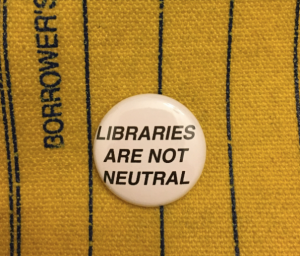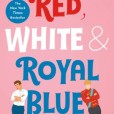Two recent events made me think (again) about the toxic nature of “library neutrality” and the fact that, more often than not, neutrality is whiteness/patriarchy/cis-heteronormativity/ableism/etc. parading around as neutrality and causing harm to folks from historically marginalized groups. The insidious thing about whiteness and these other dominant paradigms is that they are largely invisible to people in the dominant groups. It’s depressing to say this, but I sometimes feel grateful for the antisemitic macroaggressions and microaggressions I’ve been a victim of over the years because they opened my eyes to what it feels like to be othered and bullied and made me more sensitive to when it happens to others. That doesn’t mean I don’t get things wrong plenty of the time and cause harm unintentionally (we all do), but I am trying to be better because I don’t want anyone to feel the way I did when I was a target.
The first event that got me thinking about this is the fact that the Toronto Public Library, against a flurry of opposition, allowed the feminist and transphobic Megan Murphy to give a talk in one of their meeting rooms entitled “Gender Identity: What does It Mean for Society, the Law and Women?” Murphy is on a crusade to “protect” women and children from transwomen who seek to use women-only facilities like bathrooms or locker rooms. She has been banned on Twitter for her transphobia and misgendering in the past. TPL already has a pretty robust room booking policy that says —
Contracting Party’s event will not promote, or have the effect of promoting, discrimination, contempt or hatred for any group or person on the basis of race, ethnic origin, place of origin, citizenship, colour, ancestry, language, creed (religion), age, sex, gender identity, gender expression, marital status, family status, sexual orientation, disability, political affiliation, membership in a union or staff association, receipt of public assistance, level of literacy or any other similar factor.
But TPL didn’t see this event as something that promoted discrimination, contempt, or hatred. According to the City Librarian of TPL, Vickery Bowles, their stated purpose was “to have an educational and open discussion on the concept of gender identity and its legislation ramifications on women in Canada.” Now, let’s imagine that we could go in a time machine to the past. Can you imagine some of these titles being discussed in libraries?
“to have an educational and open discussion on the concept of blacks living in white neighborhoods and its ramifications on the safety of white women in the United States.”
“to have an educational and open discussion on the concept of Jews as teachers and its ramifications on our impressionable children in Germany.”
Clearly I’m dense because I can’t see a difference between any of these lecture topics. It is treating the existence and/or civil rights of one group as something that is 1) up for debate and 2) a danger to others. I’m baffled how anyone could not see such a talk as something “promoting, discrimination, contempt or hatred,” and yet Vickery Bowles is being treated like a hero for standing up against censorship in a number of publications (see Kris Joseph’s excellent blog post for links to a few of them). For more on the TPL controversy, other excellent blog posts you may want to consult are authored by —
Another thing came up this week on an occasion that should have been such a positive one. OLA Quarterly, the official publication of the Oregon Library Association (of which I’m a member and served on its Board last year) came out with a mostly fantastic issue focused on Equity, Diversity, and Inclusion. I’ve read it cover to cover and was so impressed with the way library workers in our state and in all sorts of positions in their organizations have made efforts (big and small) to improve diversity, equity, and inclusion. There’s some great stuff in the issue. Unfortunately, it ended with an article entitled “Yes, but … One Librarian’s Thoughts About Doing It Right” by Heather McNeil. I’m sure most of you can guess that with a title like that, no good can come, and you’d be so very right.
Honestly, the only positive thing I can see ever coming from this article is that when someone asks in the future what people mean by white fragility or by the idea of white people centering themselves in conversations about diversity, I have something to point to. Truly, I’ve seen no clearer example. It’s hard for me to imagine what would possess a librarian with a long and celebrated career as a children’s librarian to write something so uncollegial, offensive, and dismissive of diversity (not to mention poorly written and supported) as her parting gift to the profession upon her retirement. I can only imagine that her feeling that we have “overcorrect[ed] ourselves” on issues of diversity was so strong that she believed she was doing us all a favor in sharing it. And if that isn’t whiteness in its purest form, I don’t know what is. Her misrepresentation of criticisms of Dr. Seuss books, Dr. Debbie Reese’s speech (the text of which is available so you can form your own conclusions), the blog Reading While White, and others trying to improve the diversity of books in libraries, celebrate diverse books, and critique whiteness in libraries were egregious and mostly unsupported.
Like others, I wrote a letter to the editors of OLA Quarterly, which I also shared on Twitter and on our state library listserv. My hope is that the editors will address this issue publicly and revisit their editorial standards so something this unprofessional is never published in OLA Quarterly again. However, what troubles me most is that lots of people read this article prior to its inclusion in the issue and thought it appropriate for publication. Again, clear evidence of how invisible whiteness can be to people who are white.
McNeil argues in her article that the Caldecott Committee does not consider the race or ethnicity of the author in their voting, but that’s pretty much impossible in a racist society. What we find beautiful and touching and important is very much based on our worldview, which, when we’ve been baked in a racist society, is influenced by whiteness. And based on McNeil’s article, it’s clear that some people are more aware of their problematic biases than others. It left me wondering whether members of the Newbery and Caldecott Committees are given implicit bias training so they can be more aware of how their biases impact their views of each book. If not, they absolutely should.
What strikes me about both of these issues is the fundamental lack of empathy expressed for people from historically marginalized groups. McNeil seems to worry much more about libraries with limited budgets (who might not want to buy diverse books that she believes won’t circulate) and Dr. Seuss lovers than about young children of color who might be impacted by racist caricatures or a lack of books in their library’s collection featuring protagonists who look like them. In the case of Toronto, even if the Library decided to hold firm on allowing the meeting room to be used on intellectual freedom grounds, they could have provided affirmation for their trans patrons in the form of statements and programming. That City Librarian Bowles would not even deign to acknowledge that trans women are women suggests to me that there is nothing “neutral” about the library’s stance. The fact that they see the question of whether trans women are women as an academic question that could reasonably be up for debate speaks volumes.
No one on the @torontolibrary should serve this community, especially not @vbowlestpl , because regardless of their transphobic beliefs, they couldn’t even acknowledge my humanity in that moment.
— Runaway Supernova (@GwenBenaway) October 22, 2019
I can’t even fathom what all this feels like for LGBTQ+ staff at the Toronto Public Library who are not only being harmed by this, but in whose names these harms are being perpetrated. I felt angry about the article in OLA Quarterly on behalf of those whose needs and legitimate claims were being minimized and dismissed by McNeil, but I also felt like it made all Oregon library workers look bad. It made me feel embarrassed to be an OLA member.
In both of these cases, supporting diversity, equity, and inclusion are seen as things that are nice to do, but are secondary to other values libraries hold, like intellectual freedom. I wrote about the tension between access & diversity and intellectual freedom in American Libraries and while I was not allowed to take a strong stand in that publication, I can say here that I unequivocally put people over ideals (especially people who are frequently victimized by institutions). To me, events by white supremacists or TERFs (trans-exclusionary radical feminists) are designed to repudiate the dignity and existence of marginalized groups and to make those groups feel unsafe. How can we say we welcome everyone into our libraries if we welcome folks who explicitly make people from marginalized groups feel unwelcome? But instead, libraries hide behind the idea of neutrality and not taking sides when clearly, TPL did choose a side. So did McNeil. So did I. And hanging onto your supposed neutrality only ensures that your behavior and choices are going to be influenced by whiteness/patriarchy/cis-heteronormativity/ableism/etc.
Key to stopping situations like this from happening is helping people become aware of their own biases and privilege, but clearly that is a difficult pill for many white library workers to swallow. I was asked last Spring to serve on an Oregon Library Association Equity, Diversity, and Inclusion (EDI) Task Force that is going to have its first meeting soon. I was originally really excited to serve on this group because I could see that libraries and library workers in the state needed educational tools that facilitate open discussions and encourage critical reflection about EDI issues and privilege. I could imagine creating a multi-modal learning program where people read articles, watch videos, critically reflect on their own blogs, and participate in F2F or virtual group discussions. After this week, that need is even more glaring. When I saw that our charge was focused on creating an EDI plan, I worried that we would be simply creating a meaningless document that the OLA Board will file away and maybe develop a few long-term goals around. I hope I’m wrong and we really move the needle on EDI in the state. I think I’ve just been burned too many times when working to create transformative planning documents that administrators just file away and ignore. I want to support meaningful work and I don’t want to feel so cynical about it.
What makes me hopeful is reading the other articles in this OLA Quarterly issue where library workers are moving the needle on making their libraries, collections, and the information ecosystem more diverse, equitable, and inclusive in ways large and small. There is great work happening in Oregon. I hope you’ll take the time to read some of their stories too and will amplify them more than McNeil’s terrible contribution.
Find Ways to Say Yes: How we Made our Library More Inclusive Through Removing Barriers to Membership by Kirsten Brodbeck-Kenney
Read me a Story! by Jennifer Croft
Notes From an Equity Fellow: Casual Diversity and ALA Conferences Spark Enthusiasm by Ayn R. Frazee
Writing African American History Into Wikipedia by Laurie M. Bridges, Diana Park, and Tiah K. Edmunson-Morton
Figuring Out Where to Start, and How: One Library’s DEI Strategies by Crystal Garcia and Adrienne Doman Calkins
Exploring Multiple Identities in Children’s Literature With Project LIT by Andee Zomerman
Stitching Service Gaps Through Innovative Programming by Suad Mohamed and Lisa M. Taylor
Micro Actions Support Culture of Equity, Diversity, and Inclusion in an Academic Library by Lily Hawley and Jennifer K. Wells
Libraries are not neutral image credit Zines by JC, image is available here (where you can buy the button and some pretty great zines!)







Thanks for this post. Well stated and heart felt.
As always, your writing is eloquent and insightful. This first paragraph alone is brilliant, and reflects my own sentiments completely (including being victimized by antisemitic bullying which has aided in my understanding of majority vs. minority culture). Library neutrality is often a dangerous and unethical shield which results in librarianship as part of the problem rather than the solution.
Your post reminded me of a battle I lost to public library administration in the 1990’s. I was part of the Multicultural Diversity Committee, which provided presentations and bibliographies on diverse cultures. We were management-approved as long as we focused on topics like the Deaf and hearing impaired or people with disabilities, or celebrated holidays by highlighting international cuisine, music or dance. When I proposed a program on Racism, we were denied – on the basis that it was too negative. We changed the title to Race Relations, again denied – on the basis that our community didn’t have issues with that. With the help of a highly reputable local professor, I asked if we could present on White Privilege. When I received the third denial (quite literally: management was in denial), I quit the committee.
I’m also reminded of another incident that happened after 9/11/01. One of my librarian responsibilities was the coordination of and public contact for our “Flags of the World” display. The international flags in the collection were all donated by members of the community, and represented our multicultural diversity. After 9/11, we were asked to take down the flag of Afghanistan (which pre-dated the official Al Queda flag). I referred the request to my supervisor, who was out of town. Other administrators were also unavailable. Suddenly I was being interviewed by the press! Eventually library management was able to handle it, but I disagreed with the decision: to take down the flag of Afghanistan because it was upsetting to some. Was this library neutrality? To me, it was caving to fear-mongering and blaming Afghanistan rather than Al Queda. The flag represented Afghanis in our community, who were surely not to blame for 9/11. Regardless, the flag was removed and never replaced.
the use of the word “transphobia” “transphobic” and other variations are nothing more than slurs and are designed to shut down open and honest discussions about Transgenderism and how it affects our society.
Thank you for writing this well thought out post. I am not sure if you have swayed my thoughts on library neutrality, which to me means offering multiple viewpoints and letting individuals form their own thoughts, but you have made me think deeply. From reading some of Bowles’s comments, this is what she wanted to come of allowing Megan Murphy to speak. Perhaps it was so the public and the library community would have a very vocal and condemning reaction that could enact change on a societal and political level.
Pingback: The Library Neutrality Question – Sisyphus in the Stacks
Pingback: Reflections on Farkas II: TERF Wars, or the WoLF is at the Door – Sisyphus in the Stacks
Pingback: Reflections on Farkas I: On Being an Ally – Sisyphus in the Stacks
Pingback: High Plains Library District Programming Policy Welcomes Censorship – My blog
Pingback: High Plains Library District Programming Policy Welcomes Censorship – Imobiliare 24